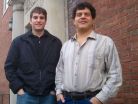(Press-News.org) EAST LANSING, Mich. — CEOs are sometimes rewarded for taking excessive risks – a practice that helped fuel the recent recession but could be altered if companies are more strategic in how they compensate their chief executives, a Michigan State University scholar argues in a new study.
Instead of issuing stock and stock options in predetermined quantities, boards of directors should vary a CEO's equity-based compensation through a plan that fosters the amount of risk-taking the firm desires, said Robert Wiseman, chairperson and professor in MSU's Department of Management.
The vast majority of chief executive officers of public companies receive stock and stock options, and often that equity pay makes up more than half of their total compensation. As the person in charge, a CEO makes the final decision on potentially risky ventures such as whether to acquire or merge with another company.
"I would argue that the CEO incentive structure encouraged the excessive risk-taking that played a strong role in the recession," Wiseman said. "So managing risk preferences though compensation is something that should be on the agenda of any company's board of directors."
For the study, Wiseman and colleagues Geoffrey Martin of Melbourne Business School and Luis Gomez-Mejia of Texas A&M University examined CEO compensation and financial data for publicly traded manufacturing firms from 1996 to 2009.
When it came to CEOs' equity pay, the study analyzed current wealth – or how much the stock and stock options would be worth if cashed out today – and prospective wealth, or how much more the equity would be worth at its expiration date, typically years down the road.
Chief executives who had three times as much prospective wealth as current wealth were more willing to take potentially destructive risks. Those with roughly the same amount of current wealth and prospective wealth were less inclined to take such risks, ostensibly because they feared losing the sizable amount they had earned, Wiseman said.
A useful benchmark for companies looking to encourage value-enhancing risk-taking is about 2 to 1 – or about twice as much prospective wealth as current wealth, the researchers said. In other words, a CEO who has $20 million in prospective wealth and $10 million in current wealth will likely take risks aimed at growing the company sensibly.
The findings challenge the current mindset guiding most compensation plans – that stock options carry no risk for chief executives. But Wiseman argues that CEOs do, in fact, consider stock options when calculating their personal wealth, particularly as the options grow in value. Thus, equity pay should be issued more strategically.
"If a firm's board of directors wants to influence the CEO's risk-taking behavior, it should consider changing how it rewards that CEO," Wiseman said. "Simply imitating what every other company is doing – like issuing a predetermined number of stock options semi-annually or annually – may not necessarily be the right thing to do."
The study will appear in a forthcoming issue of the Academy of Management Journal. A version also appears in the October issue of Harvard Business Review.
INFORMATION:
CEO incentives should be more strategic
2012-09-18
ELSE PRESS RELEASES FROM THIS DATE:
Light drinking may relate to increase in risk for certain cancers
2012-09-18
The majority of observational studies have shown that alcohol intake, especially heavy drinking, increases a number of upper-aero-digestive tract (UADT) and other cancers, and even moderate drinking is associated with a slight increase in the risk of breast cancer. A meta analysis published in the Annals of Oncology compares the effects between light drinkers (an average reported intake of up to 1 typical drink/day) versus "non-drinkers" in terms of relative risks for a number of types of cancer.
The authors concluded that while the risk of these cancers was only slightly ...
How much product information do consumers want?
2012-09-18
PROVIDENCE, R.I. [Brown University] — A study published online in the Journal of Consumer Research finds that people can differ widely on the level of detail makes them feel they understand something. In experiments, the very same explanations that some subjects required before they would pay top dollar seemed to drive down what others were willing to pay. The natural trick for a marketer would be to figure out which customers are which. The study does that, too.
"The fact is that people differ," said Steven Sloman, professor of cognitive, linguistic, and psychological ...
Study provides roadmap for delirium risks, prevention, treatment, prognosis and research
2012-09-18
INDIANAPOLIS -- Delirium, a common acute condition with significant short- and long-term effects on cognition and function, should be identified as an indicator of poor long-term prognosis, prompting immediate and effective management strategies, according to the authors of a new systematic evidence review.
"Delirium is extremely common among older adults in intensive care units and is not uncommon in other hospital units and in nursing homes, but too often it's ignored or accepted as inevitable. Delirium significantly increases risk of developing dementia and triples ...
Seeing fewer older people in the street may lead low-income adults to fast-track their lives
2012-09-18
Why do people in deprived areas live life in the fast lane? It may be because of the age of people they observe in the street, according to a new study by Daniel Nettle and colleagues from Newcastle University in the UK. Their work suggests that because fewer older people are seen out in the street in deprived neighborhoods, younger generations assume that people die young. As a result, they may be adapting the speed at which they live their lives accordingly—for example, by having children earlier in life. Nettle and team's work is published online in Springer's journal ...
Early menopause associated with increased risk of heart disease, stroke
2012-09-18
Women who go into early menopause are twice as likely to suffer from coronary heart disease and stroke, new Johns Hopkins-led research suggests.
The association holds true in patients from a variety of different ethnic backgrounds, the study found, and is independent of traditional cardiovascular disease risk factors, the scientists say.
"If physicians know a patient has entered menopause before her 46th birthday, they can be extra vigilant in making recommendations and providing treatments to help prevent heart attacks and stroke," says Dhananjay Vaidya, Ph.D., an ...
Oral bacteria may signal pancreatic cancer risk
2012-09-18
PROVIDENCE, R.I. [Brown University] — A new study finds significant associations between antibodies for multiple oral bacteria and the risk of pancreatic cancer, adding support for the emerging idea that the ostensibly distant medical conditions are related.
The study of blood samples from more than 800 European adults, published online Sept. 18 in the journal Gut, found that high antibody levels for one of the more infectious periodontal bacterium strains of Porphyromonas gingivalis were associated with a two-fold risk for pancreatic cancer. Meanwhile, study subjects ...
Substance-use disorders linked to increased risk of death for veterans with PTSD
2012-09-18
Veterans suffering from post-traumatic stress disorder who are also battling drug or alcohol problems face a higher risk of death, according to new research from the University of Michigan Health System and the VA Ann Arbor Healthcare System.
The new study is the first to examine the association between drug or alcohol use disorders and death in veterans with PTSD, and also includes data from the nation's youngest veterans who have returned from conflict in Iraq and Afghanistan.
Kipling Bohnert, Ph.D., the study's lead author, says the research sheds new light on the ...
Precision motion tracking -- thousands of cells at a time
2012-09-18
Researchers have developed a new way to observe and track large numbers of rapidly moving objects under a microscope, capturing precise motion paths in three dimensions.
Over the course of the study--reported online Sept. 17, 2012, in the Proceedings of the National Academy of Sciences--researchers followed an unprecedented 24,000 rapidly moving cells over wide fields of view and through large sample volumes, recording each cell's path for as long as 20 seconds.
"We can very precisely track the motion of small things, more than a thousand of them at the same time, in ...
Protection for humans on Mars
2012-09-18
This press release is available in German.On Earth the atmosphere and the magnetic field weaken cosmic rays. But on Moon and Mars they pelt down unhamperdly. The cosmic radiation can harm astronauts and could cause cancer in the long run as a result of damage in DNA and cells.
Chiara La Tessa is manager of experiments in GSI biophysics. She explains why Moon or Mars ground stations would not be built from terrestrial high tech material: "In space travels every gram counts. Transporting building material through space would lead to a cost explosion. That is why ground ...
Lack of sleep affects bone health and bone marrow activity
2012-09-18
Scientists at the Medical College of Wisconsin, in a team led by Carol Everson, Ph.D., professor of neurology, cell biology, neurobiology and anatomy, have discovered abnormalities in bone and bone marrow in rats undergoing chronic lack of sleep. They discovered abnormalities in serum markers of bone metabolism in sleep-deprived rats, which led them to conduct direct measurements of bone parameters; this time in rats experiencing recurrent sleep restriction during a large portion of their young adulthood.
The results show a dramatic imbalance between bone apposition ...




